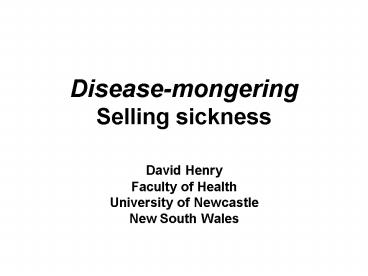Diseasemongering Selling sickness - PowerPoint PPT Presentation
1 / 19
Title:
Diseasemongering Selling sickness
Description:
Thousands of sites carried MoDeD some featuring it as ... (CNN, BBC, NPR, Voice of America, Chicago Tribune, Business Week, PR Week) Complaints to the BMJ. ... – PowerPoint PPT presentation
Number of Views:217
Avg rating:3.0/5.0
Title: Diseasemongering Selling sickness
1
Disease-mongeringSelling sickness
- David Henry
- Faculty of Health
- University of Newcastle
- New South Wales
2
Motivational Deficiency Disorder You are not lazy
you are sick
3
(No Transcript)
4
(No Transcript)
5
(No Transcript)
6
Reaction
- Thousands of sites carried MoDeD some featuring
it as serious news, others as April Fools Joke - We gave many overseas interviews (CNN, BBC, NPR,
Voice of America, Chicago Tribune, Business Week,
PR Week) - Complaints to the BMJ. The editor of the the
Dominion Post thundered "Credibility is hard
earned, you damaged yours and ours as a result."
(http//bmj.bmjjournals.com/cgi/content/full/332/7
546/0-f).
7
Why did people believe it?
- Plausible disorder and pathogenesis
- Intuitive appeal
- Impressive scientific language
- Credible academic sources and journal
- Typical statistics (prevalence, cost of illness)
- Expectation of continual medical progress
- Blamelessness transfer of responsibility
8
(No Transcript)
9
".....an expanding medical establishment, faced
with a healthier population of its own creation,
is driven to medicating normal life events (such
as the menopause), to converting risks into
diseases, and to treating trivial complaints with
fancy procedures.." Roy Porter 1996
10
Disease-mongering
- Disease-mongering is a useful term to describe a
form of medicalisation where the primary motive
is to market products and services - Treating the sick is not as profitable as
treating the healthy members of society (they are
more of them) - Close relationships between industry, the medical
profession, patient support groups and a
compliant media lead to enormous pressure to
fund new treatments
11
Candidates for disease-mongering
- Obesity
- Ageing
- Sexual dysfunction (male and female)
- Social anxiety disorder
- Forgetfulness
- Mood swings
- Anger / intermittent explosive disorder
- Osteoporosis
- Hyperactivity/learning disabilities
- Bipolar Disorder
- Unhappiness (incl post-traumatic stress disorder)
- Menopause
- Irritable bowel
- Genetic testing
- Minor skin lesions
12
Disease-mongering classification(Moynihan et
al. BMJ 2002 324 886-891 )
- Ordinary processes and life experiences treated
as medical problems - Mild symptoms as portents of serious disease
- Personal or social problems as medical ones
- Risks conceptualised as diseases
- Prevalence and outcomes exaggerated
13
Irritable Bowel
- In Vivo Communications
- IBS must be established in the minds of doctors
as a significant and discrete disease state - Patients need to be convinced that IBS is a
common and recognised medical disorder - Need for an advisory board with one KOL from
each state in Australia
14
Mongering of social phobia
- "You may even need to reinforce the actual
existence of a disease and/or the value of
treating it. A classic example of this was the
need to create recognition in Europe of social
phobia as a distinct clinical entity and the
potential of antidepressant agents such as
moclobemide to treat it," - Pharmaceutical Marketing 2001
15
The death rate in women with hip fractures is
greater than the incidence of all female cancers
combined
16
Corporate relations
- Medical profession close associations, genuine
conflicts of interest, in kind and financial
support, advisory panels, opinion leaders,
guidelines, increasing government and police
interests - Patient support groups single diseases, often
financially strapped, naïve - Media uncritical, hurried, naïve, obsequious,
PR-driven, waiting for the next breakthrough,
susceptible to framing effects
17
Why is DM so successful?
- Plays on our deepest fears
- Need to conform to idealised notions of
appearance and behaviour - The alliances of corporations, PR companies,
doctors and patient organisations are very
powerful - Highly motivated and effective companies
- We live in a world of marketing
18
Disease-mongering campaign
- The aim was to make disease-mongering a meme
(Dawkins 1976) "a unit of cultural transmission,
or a unit of imitation." - Created a disorder Motivational deficiency
Disorder launched on April 1st 2006 - Commissioned a series of papers in a journal
PLoS Medicine April 10th 2006 - Held a Conference April 11th to 13th 2006
19
Conclusion
- With each condition featured here there are
individuals in whom the distress caused by it
justifies management - But the art of medicine is to define for each
condition and each individual where the line is
drawn between the probability of benefit and harm































